A lot of clients come to us and proactively decide to plan for the possibility that they may need to have Medicaid pay for the cost of nursing home care one day.
When most people think of Medicaid, they think of health insurance for people that have insufficient income to pay for medical care themselves. While that is also a benefit within the umbrella of “Medicaid,” there are other benefits. If you lack sufficient assets to pay for nursing home care, then Medicaid may be available to assist with the cost of care.
One of the prerequisites to qualifying to have Medicaid pay for nursing home care is that the person must have less than $2,000 in assets. There are some things that don’t count against a person, so don’t go selling off your assets just yet.
If a person comes to us several years in advance of needing Medicaid, we can often help them divert all or the majority of their assets into non-countable forms so that when it comes time to need Medicaid, the assets that would have otherwise counted against the person are now not within the reach of Medicaid and won’t count against the person.
This has the benefit of permitting funds to be available to help the person later with luxuries above and beyond the very small pittance of an allowance that Medicaid would permit you to keep out of your own income. It also prevents a person from having to spend all of their own money on nursing home care, which leaves some wealth for the next generation.

If you have one person who manages to acquire assets over the course of their life and dies suddenly one day, those assets will pass to the next generation. But if you have a person who acquires those same assets, but instead of dying suddenly, dies slowly from a physical or cognitive condition that requires a decade of nursing home care, there may be nothing left for the next generation.
Accounting for the possibility of being that second person and needing long term care by planning against that risk ahead of time puts your family in the same position as the first person. The problem is no one really knows if they are going to need Medicaid or not several years in advance, so it is prudent to plan as if you are going to need it.
However, the vast majority of people do not plan for the possibility that they will need Medicaid one day. So while we have a lot of clients who do proactively plan, we receive far more calls from people who don’t have “years” before they need Medicaid.
Usually, someone is calling our office because a loved one needs Medicaid now, or soon, and does not have the luxury of waiting several years to apply so we can proactively shuffle assets around.
When someone does not have years to wait before getting Medicaid, and needs it soon or now, we refer to that as Medicaid Crisis Planning or Emergency Medicaid Planning. The objective, to put it bluntly, is to do the best we can with what we have to mitigate the damage.
Essentially, we try to take advantage of as many options as we have for moving assets around and utilizing different tools to help the person become eligible for Medicaid sooner while permitting more of their funds to be used for things that will benefit them or their families rather than being put towards the cost of their care.
Often, we refer to this process as a “spend down” plan. When dealing with Medicaid, people will have “exempt” and “non-exempt” assets. Exempt assets do not count towards the $2,000 people are allowed to have. Non-Exempt assets do count against the person applying for Medicaid. The main goal of “spending down” assets is not so much to actually spend the asset, but rather to move funds from “non-exempt” buckets to “exempt” buckets.
For example, one might buy term life insurance, a vehicle, a burial plot, jewelry, pay down a mortgage, or buy household goods. Such items, strictly speaking, do involve spending money, but the purpose is not to make the person poorer, but rather to convert their assets to things that will provide some benefit to the applicant while being a type of asset that does not count against them when they apply for Medicaid.
While this is not an exhaustive list, and not all options are appropriate in every circumstance, here are some common spend down options used in Emergency Medicaid Planning:
1) Residential Improvements – A new roof, new flooring, new windows, an HVAC system, or other things that would increase the future sale value of the home, and if the applicant is going to stay at home, things that will enable them to stay home longer, such as handicap accessible ramps.
2) Payment of Debts – Paying down a mortgage, car loan, or other debts is sometimes used to decrease the liquid assets available to an applicant.
3) Promissory Notes – Sometimes promissory notes can be used to move funds out, but these notes have several rules, such as the note has to be set for full repayment during the actual or expected lifetime of the lender, the repayment must be made in equal amounts during the term of the note, and there cannot be any sort of forgiveness at the death of the lender.
4) Purchasing a Life Estate – An applicant can purchase a life estate in the home of another if they are going to reside in the home for at least 12 consecutive months following the purchase.
5) Purchasing a real estate interest – An applicant could purchase a joint tenancy interest in real property, and it does not have to be an equal interest.
6) Tangible personal property – Applicants can buy tangible items, such as televisions, recliners, a motorized wheel chair, and other items that are for the benefit of the applicant.
7) Burial Contracts – You can have a funeral company assist with irrevocably assigning a life insurance policy or annuity, or paying ahead of time for burial services. The designation of the funeral home as the beneficiary must be irrevocable. There is no limit on how much can be applied towards such a contract. This is often one of the first things we look at when trying to assist with a spend down plan.
8) Burial Plots – Graves, crypts, mausoleums, urns, or other repositories are non-countable assets, and there is no exclusion on the number of spaces that are owned.
9) Vehicles – A vehicle must be used for the transportation of the applicant, the applicant’s spouse, or the applicant’s dependent child. However, a vehicle can be owned and not counted against the applicant.
10) Personal Services Contracts – Personal Service Contracts can be used to reduce assets. There are very specific requirements which have to be met, including:
a. Contract must be in writing and signed before services are rendered and payment is made.
b. Contract must be signed by the applicant or his/her legal representative.
c. Applicant cannot be residing in a facility at the time of receiving services.
d. A physician must have recommended such services to prevent entry into a facility at the time of signing.
e. Contract itself shows the type, frequency, and duration of the services, as well as the cost.
f. The payment must be for fair market value as established by written statements from area businesses providing such services. Otherwise, you’ll have to use minimum wage.
11) Term Life Insurance – Term life insurance is entirely excluded.
12) Whole Life Insurance – Life insurance (other than term) does not count against the person if the cash surrender value of all the policies is less than $10,000.
Keep in mind that there are a lot of other techniques used to help a person needing Medicaid to get it sooner without having to spend every dime they have on nursing home costs. These are the most popular though. Our office helps people create and execute Emergency Medicaid Plans to help them become eligible for Medicaid sooner.
Another facet of Emergency Medicaid Planning involves converting real estate into a form that puts it beyond the reach of Medicaid Estate Recovery. When someone needs Medicaid, their real estate is not countable, but often, it must be sold after the applicant dies to repay Medicaid for the cost they incurred.
“Saving the home” is usually a top priority for an emergency Medicaid applicant. We can employ techniques that convert the asset into both a non-countable asset for purposes of determining eligibility for Medicaid, and make it so that Medicaid Estate Recovery is precluded from being able to force its sale when the person dies.
The attorneys at Hopler Wilms & Hanna, PLLC, help people regularly with matters involving Medicaid along with other elder law issues, such as Powers of Attorney, Guardianship, and Exploitation of the Elderly. If you need assistance with any elder law issue, including spending down assets to help someone become eligible, please reach out for assistance.
Call us today for help with Medicaid!

